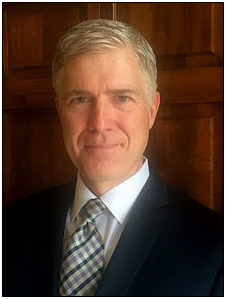By Peter Hong
February 13, 2016 may be the day the presidential election turned, and with it, the course of American politics.
With the sudden death of Justice Antonin Scalia, the balance of the U.S. Supreme Court was in jeopardy. With three non-activist justices (and only two reliable votes) left on the conservative side, prospects for the rule of law seemed murky at best. With critical issues like abortion, Second Amendment, religious liberty, property rights, and immigration enforcement hanging in the delicate balance, voters took note.
The exit polls bore this out: 70 percent of voters — and 75 percent of Trump voters — said Supreme Court appointments were either an important or the most important factor in their vote. Over one-quarter of Trump voters rated the Supreme Court the most important factor in electing him President.
Restoring balance to the highest court in the land was critical to the historic Trump victory. Donald Trump recognized it — and with his ascension to the White House, acted decisively.
In nominating Judge Neil Gorsuch to fill Scalia’s seat, President Trump selected an eminently qualified, highly regarded jurist — and one with proper respect for the rule of law. In describing Gorsuch, many legal observers cite the parallels between his legal philosophy and that of Scalia — high praise indeed.
Judge Gorsuch himself clearly stated his textualist and originalist philosophy of jurisprudence last year when he paid tribute to the Scalia legacy:
“(That) judges should instead strive (if humanly and so imperfectly) to apply the law as it is, focusing backward, not forward, and looking to text, structure, and history to decide what a reasonable reader at the time of the events in question would have understood the law to be—not to decide cases based on their own moral convictions or the policy consequences they believe might serve society best.”
In other words, Gorsuch announced that judges should behave like – well, judges. If anyone were confused as to how he sees his role, Gorsuch quoted Scalia: “[i]f you’re going to be a good and faithful judge, you have to resign yourself to the fact that you’re not always going to like the conclusions you reach. If you like them all the time, you’re probably doing something wrong.”
Like Scalia, Gorsuch is unafraid to confront “established” judicial doctrine when it does not comply with a strict interpretation of the law.
Consider Gorsuch’s challenge to the long-held Chevron doctrine. Chevron articulates the current legal standard that federal courts grant deference to agencies’ interpretations of their governing statutes. For anyone concerned about the constitutionally dubious powers of the administrative state to effectively make up law, reconsidering Chevron is a must.
In a separate opinion in Gutierrez-Brizuela v. Lynch, Judge Gorsuch wrote that Chevron “permit[s] executive bureaucracies to swallow huge amounts of core judicial and legislative power and concentrate federal power in a way that seems more than a little difficult to square with the Constitution of the framers’ design.”
If the cancerous administrative state is to be deconstructed — as called for by Trump strategist Steve Bannon — judges must be prepared to reject Chevron and place limits on agency overreach. Judge Gorsuch appears to have no fear of judges carrying out their constitutionally appropriate duties; if Chevron is reopened, Justice Gorsuch would offer a much-needed voice.
Finally, Judge Gorsuch should be confirmed for the simple reason that the new president appointed him. Elections have consequences. In 2016, voters faced a stark choice between two distinct worldviews. They selected Trump’s.
From the moment President Trump was sworn in, Democrats have abused Senate procedures to delay and derail his agenda. If their scurrilous tactics continue, Majority Leader Mitch McConnell may be forced to trigger the “nuclear option” (Washington talk for the principle that “majority rules”). McConnell should use every tool available to get Gorsuch confirmed without delay.
When history considers Justice Neil Gorsuch’s legacy, none of us will agree with all the results of his decisions, not even him. His greatest virtue is that he approaches each case like a judge, not a politician. If past is prologue, we can count on this esteemed jurist to follow the path blazed by Justice Scalia. Neil Gorsuch should be confirmed without delay.
Peter Hong is a contributing reporter at Americans for Limited Government.







